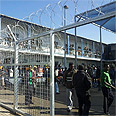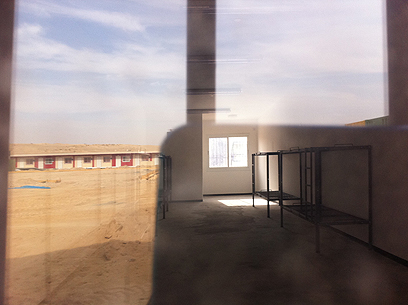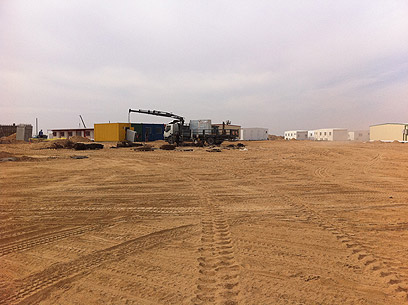
Human rights activists claimed Monday that these conditions will render the migrates "invisible," cutting any link they may have to the outside world.
Related Stories:
- South TA residents protest against African infiltrators
- Petition: Yishai's plan to detain migrants 'barbaric'
- Migrant denied treatment, gives birth to dead baby
Since the legislation aiming to fight the illegal infiltration of African migrants into Israel came into effect in June, hundreds of migrants and asylum seekers have been detained in a number of prisons in Israel.
Interior Minister Eli Yishai declared that he intends on pursuing the arrest of 15,000 migrates, but authorities predict only a few hundreds migrant will be detained in the following weeks.

The Sadot facility
Either way, the ASSAF group, Aid Organization for Refugees and Asylum Seekers in Israel, said that they intend to take preventive measures, as they joined forces with the Migrant Workers Hotline and Amnesty International, and toured the existing and planned detention facilities.
The only positive aspect of the tour was the final stop – a boarding school in Nitzana that currently hosts 47 teenagers, ages 14-17, that arrived from Sudan and Eritrea with no relatives. These children study Hebrew and those who excel attend a regular Israeli school.
According to the Migrate Workers' Hotline, some 2,000 asylum seekers are detained in the Saharonim Prison, 800 are detained at Ktzi'ot Prison facility and 500 are held at Givon Prison. The government has already ordered that all of these facilities be expanded, in order to accommodate their growing population, while two new compounds are currently being built.

Expanding Ktzi'ot Prison facility
On January, the Knesset introduced some amendments to the bill, which were implemented the following June. These amendments allow for the automatic arrest of any person who enters Israel illegally, and further allows their administrative detention for a period of up to three years.
The bill's purpose is to deter migrants, refugees and infiltrators from entering Israel illegally. It defines "infiltrator" as "any individual who enters Israel not via one of its official border crossings," and makes no distinctions between migrants workers, refugees and illegal infiltrators who pose a security threat.
The bill states migrants and their children can be detained for a minimum duration of three years and in some cases for an unlimited period.
Human rights organizations agree that an open borders policy will encourage illegal migrants to come to Israel, but they claim there are more humane ways of dealing with the issue.
The solution, they said, is rooted in assessing the asylum seekers' requests while ensuring their rights are observed, as is commonly done by many western countries.
"Jailing thousands of innocent people in harsh conditions in the desert does not aid Israel when dealing with the issue. While the government detains thousands, many are left with no status what so ever and this policy offend not only the migrants but the communities in which they live at," the activists concluded.
- Receive Ynetnews updates
directly to your desktop















